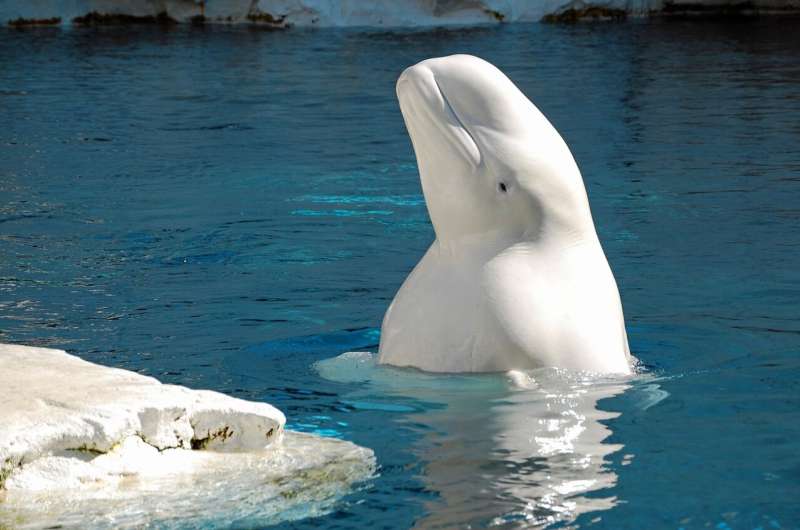This article has been reviewed according to Science X's editorial process and policies. Editors have highlighted the following attributes while ensuring the content's credibility:
fact-checked
peer-reviewed publication
proofread
New research on their metabolism helps conserve endangered beluga whales in Alaska

New data provided by studying the beluga whales at Georgia Aquarium helps close a key information gap about how much food these whales need to thrive. The information will inform important management decisions for their counterparts in Alaska's Cook Inlet, which are protected under the U.S. Endangered Species Act (ESA).
A new study released in the Journal of Experimental Biology, led by Terrie M. Williams, Director of the Integrative Carnivore EcoPhysiology Lab, with her graduate student Jason John at the University of California-Santa Cruz in partnership with Georgia Aquarium, reveals that the whales' unique metabolism and elevated caloric needs may limit their ability to escape from potential human disturbances.
The Cook Inlet beluga population was listed as endangered in 2008 due to a decline from over-harvesting by Alaska's native hunters. But despite a cessation in whaling and other efforts to help the population recover, their numbers have not increased, and researchers do not know why.
Difficulty collecting this type of data on belugas in the wild has made it hard for scientists to identify why they have failed to recover from excessive harvest. This study, which started in 2018, was a collaboration between U.C. Santa Cruz and Georgia Aquarium with the Alaska Region of NOAA Fisheries, which has management authority for Cook Inlet belugas.
Scientists collected data about energy output from the aquarium's one adult male and two adult female belugas while resting in metabolic domes, during submerged swimming, and when diving for food.
"We are losing large wild species all over the world," said Williams. "One way that we might be able to prevent wholesale extinctions is to do the basic science that allows us to predict what these animals need to live in this crazy, changing world."
"This study is one element we can do here to create a better understanding of how these animals take in and use energy," said Dennis Christen, Georgia Aquarium's Senior Director, Mammals and Birds. "That's a measurement that's nearly impossible to get in the wild. By understanding their metabolism, we can get an understanding of what they have to feed on in the wild and whether it is enough."
"Taking these baseline measurements—which are the gold standard for conservation modeling—helps us to understand how these whales are built," Williams explained. "There aren't many facilities like Georgia Aquarium that have the capabilities and research mindset to conduct this type of research."
Georgia Aquarium scientists prepared the belugas for the study over a six-month period, using positive reinforcement and operant conditioning techniques to measure their resting and active metabolic rates in different states.
Open flow respirometry was used to measure oxygen consumption using a plexiglass dome for the animals to breathe in, and accelerometers were used to measure movement and swim stroke rates in the water.
Data gleaned from this research will help create predictive energy models to evaluate the potential impact of human activities on beluga whales, and a close relative, Arctic narwhals.
The metabolic study conducted by this collaboration is helping to inform measures to ensure Cook Inlet belugas have adequate resources to fuel their caloric needs. Under the ESA, any action that is funded or permitted by the federal government that has the potential to impact a threatened or endangered species must be reviewed. This includes activities like oil and gas exploration and development, marine construction, and commercial fishing.
This review includes mitigations to reduce impacts on ESA species. Obtaining a baseline on the calorie needs of Cook Inlet belugas will help inform these mitigations to reduce the effects of these activities on Cook Inlet belugas.
"Wild belugas typically use the calories from ingesting fish to fuel growth, activity, maintaining their health and reproducing," said Williams. "With increased human disturbance, calories will have to be diverted to respond to perceived threats. Such energy imbalance cannot be sustained for long periods without negative consequences."
"The whales at Georgia Aquarium are ambassadors for their species. Getting the opportunity to participate in a research study like this one means a lot," said Katie Flammer, associate curator, Mammals and Birds. "These animals, and our training team, are helping beluga whales globally."
More information: Marine mammal metabolic measures help save species, Journal of Experimental Biology (2024).
Journal information: Journal of Experimental Biology
Provided by Georgia Aquarium



















